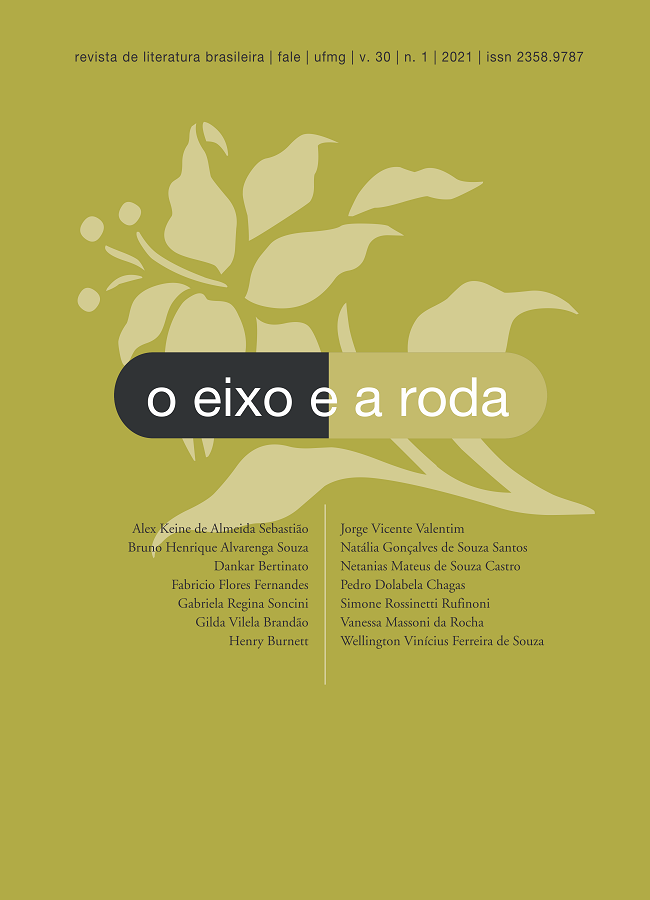Narrating and Being
The Us Narrator’s Personality Eu receberia as piores notícias de seus lindos lábios
DOI:
https://doi.org/10.17851/2358-9787.30.1.170-188Keywords:
narrator, first person, contemporary Brazilian romance, Eu receberia as piores notícias de seus lindos lábiosAbstract
The history of the novel saw, before it, different ways of narrating, as pointed out by the writings of Theodor W. Adorno, for example. From impersonal narrators, maintaining the safe distance that the third person narrative gives him until the cases in which what is narrated is something directly related to the narrator himself. This seems to be the case with Marçal Aquino’s novel I would receive the worst news from his beautiful lips, which tells of Cauby and Lavínia’s loving involvement from the point of view of Cauby himself. He narrates in a way whose relationship with himself and the narrative is explicit, such is his passion for his experiences and the act of narrating. This manifests itself both in language, in terms of narrative choices, and in the actions of the narrator-character-protagonist who narrates and experiences what he narrates. Its most notable characteristics are passionality, the ability to photographically record details of the narrative and break with traditional narrative techniques.
References
ADORNO, Theodor W. Notas de literatura I. 2. ed. São Paulo: Duas Cidades: Editora 34, 2003.
AMORIM, Marília. Cronotopo e exotopia. In: BRAIT, Beth (org.). Bakhtin: outros conceitos chave. São Paulo: Contexto, 2006. p. 95-114.
AQUINO, Marçal. Eu receberia as piores notícias de seus lindos lábios. São Paulo: Companhia das Letras, 2005.
ARISTÓTELES. Ética a Nicômaco. Tradução de Leonel Vallandro e Gerd Bornheim da versão inglesa de W. D. Ross. São Paulo: Abril Cultural, 1984. p. 44-236. (Coleção Os pensadores).
BAKHTIN, Mikhail. Teoria do romance II: as formas do tempo e do cronotopo. São Paulo: Editora 34, 2018.
BENJAMIN, Walter. A obra de arte na era de sua reprodutibilidade técnica. Porto Alegre: L&PM, 2019.
BENJAMIN, Walter. O narrador. Considerações sobre a obra de Nikolai Leskov. In: _____. Magia e técnica, arte e política: ensaios sobre literatura e história da cultura. 7. ed. São Paulo: Editora Brasiliense, 1994. p. 197-221.
BRANDÃO, Junito de Souza. Mitologia grega. Petrópolis: Vozes, 1996. v. I.
DALCIN, Camila. Eu receberia as piores notícias de seus lindos lábios: linguagem e forma narrativa. 2015. 99 f. Dissertação (Mestrado em Letras) – Programa de Pós-Graduação em Letras, Universidade Federal de Santa Maria, Santa Maria, 2015.
EAGLETON, Terry. Marxismo e crítica literária. São Paulo: Editora Unesp, 2011.
FRIEDMAN, Norman. O ponto de vista na ficção: o desenvolvimento de um conceito. Revista USP, São Paulo, n. 53, p. 166-182, mar./maio 2002. DOI: https://doi.org/10.11606/issn.2316-9036.v0i53p166-182. Disponível em: https://www.revistas.usp.br/revusp/article/view/33195/35933. Acesso em: 1º jun. 2020.
LUKÁCS, Georg. O romance como epopeia burguesa. Ensaios Ad hominem, Estudos e edições Ad hominem, São Paulo, n. 1, tomo 2, p. 87-117, 1999.
RESENDE, Beatriz. Contemporâneos: expressões da literatura brasileira no século XXI. Rio de Janeiro: Casa da Palavra, 2008.
ROSENFELD, Anatol. Texto/contexto. São Paulo: Perspectiva, 1969.










